Zwickau
Zwickau (German pronunciation: [ˈtsvɪkaʊ]) is a town in Saxony, Germany, and the capital of the Zwickau district. It is situated in a valley at the foot of the Erzgebirge mountains, is part of Central Germany (cultural area) and is geographically linked to the urban areas of Leipzig-Halle, Dresden and Chemnitz. The town has approximately 100,000 inhabitants.[2] From 1834 until 1952 Zwickau was the seat of the government of the south-western region of Saxony.
Zwickau | |
|---|---|
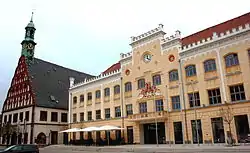 Zwickau town hall and theatre | |
 Flag  Coat of arms | |
Location of Zwickau within Zwickau district 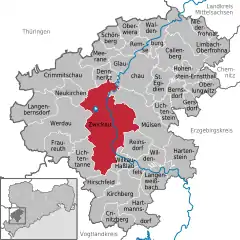 | |
 Zwickau 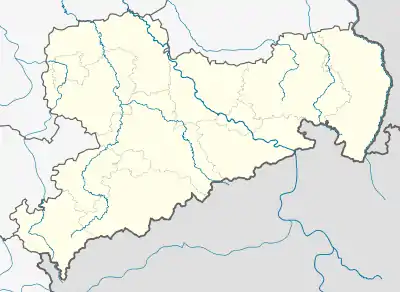 Zwickau | |
| Coordinates: 50°43′N 12°30′E | |
| Country | Germany |
| State | Saxony |
| District | Zwickau |
| Subdivisions | 5 urban units with 35 townships |
| Government | |
| • Lord mayor | Pia Findeiß (SPD) |
| Area | |
| • Total | 102.54 km2 (39.59 sq mi) |
| Population (2019-12-31)[1] | |
| • Total | 88,690 |
| • Density | 860/km2 (2,200/sq mi) |
| Time zone | UTC+01:00 (CET) |
| • Summer (DST) | UTC+02:00 (CEST) |
| Postal codes | 08001–08067 |
| Dialling codes | 0375 |
| Vehicle registration | Z |
| Website | www |
Zwickau is the centre of the Saxon automotive industry, with a tradition over one hundred years old,[3] including car makers Horch, Audi, Auto Union, Trabant and Volkswagen.[4] The University of Applied Sciences Zwickau (Westsächsische Hochschule Zwickau) trains automotive engineers.
The valley of the 166-kilometre (103-mile) long Zwickauer Mulde river stretches from the Vogtland to Colditz Castle at the other end. The Silver Road, Saxony's longest tourist route, connects Dresden with Zwickau.[5]
Zwickau can be reached by car via the nearby Autobahns A4 and A72, the main railway station (Zwickau Hauptbahnhof), via a public airfield which takes light aircraft, and by bike along river Zwickauer Mulde on the so-called Mulderadweg.[6]
History

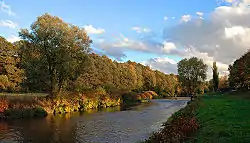
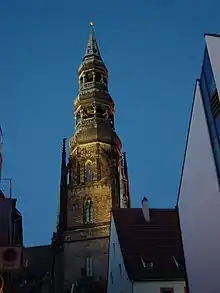
The region around Zwickau was settled by Slavs as early as the 7th century AD. The name Zwickau is probably a Germanization of the Sorbian toponym Šwikawa, which derives from Svarozič, the Slavic Sun and fire god.[7] In the 10th century, German settlers began arriving and the native Slavs were Christianized. A trading place known as terretorio Zcwickaw(in Medieval Latin) was mentioned in 1118. The settlement received a town charter in 1212, and hosted Franciscans and Cistercians during the 13th century. Zwickau was a free imperial city from 1290–1323, but was subsequently granted to the Margraviate of Meissen. Although regional mining began in 1316, extensive mining increased with the discovery of silver in the Schneeberg in 1470. Because of the silver ore deposits in the Erzgebirge, Zwickau developed in the 15th and 16th centuries and grew to be an important economic and cultural centre of Saxony.
Its nine churches include the Gothic church of St. Mary (1451–1536), with a spire 285 ft (87 m) high and a bell weighing 51 tons. The church contains an altar with wood carvings, eight paintings by Michael Wohlgemuth and a pietà in carved and painted wood by Peter Breuer.
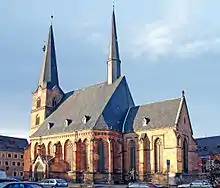
The late Gothic church of St. Catharine has an altar piece ascribed to Lucas Cranach the elder, and is remembered because Thomas Müntzer was once pastor there (1520–22). The town hall was begun in 1404 and rebuilt many times since. The municipal archives include documents dating back to the 13th century.
Early printed books from the Middle Ages, historical documents, letters and books are kept in the Town Archives (e.g. Meister Singer volumes by Hans Sachs (1494–1576)), and in the School Library founded by scholars and by the town clerk Stephan Roth during the Reformation.in
In 1520 Martin Luther dedicated his treatise "On the Freedom of the Christian Man" to his friend Hermann Muehlpfort, the Lord Mayor of Zwickau. The Anabaptist movement of 1525 began at Zwickau under the inspiration of the "Zwickau prophets".[8] After Wittenberg, it became the first city in Europe to join the Lutheran Reformation. The late Gothic Gewandhaus (cloth merchants' hall), was built in 1522–24 and is now converted into a theatre. The city was seriously damaged during the Thirty Years' War.
The old city of Zwickau, perched on a hill, is surrounded by heights with extensive forests and a municipal park. Near the town are the Hartenstein area, for example, with Stein and Wolfsbrunn castles and the Prinzenhöhle cav, as well as the Auersberg peak (1019 meters) and the winter sports areas around Johanngeorgenstadt and the Vogtland.
In the Old Town the Cathedral and the Gewandhaus (cloth merchants' hall) originate in the 16th century and when Schneeberg silver was traded. In the 19th century the city's economy was driven by industrial coal mining and later by automobile manufacturing.
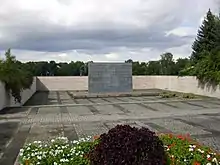
During World War II, in 1942, a Nazi show trial of the members of the Czarny Legion Polish underground resistance organization from Gostyń was held in Zwickau, after which 12 members were executed in Dresden, and several dozen were imprisoned in Nazi concentration camps, where 37 of them died.[9] In May 1942, five Polish students of the Salesian Oratory in Poznań, known as the Poznań Five or five of the 108 Blessed Polish Martyrs of World War II, were imprisoned in Zwickau, before being executed in Dresden.[10] A subcamp of the Flossenbürg concentration camp was located in Zwickau, whose prisoners were mostly Poles and Russians, but also Italians, French, Hungarians, Jews, Czechs, Germans and others.[11]
On 17 April 1945, US troops entered the city. They withdrew on 30 June 1945 and handed Zwickau to the Soviet Red Army. Between 1944 and 2003, the city had a population of over 100,000.
A major employer is Volkswagen which assembles its Golf, Passat and Phaeton models in the Zwickau-Mosel vehicle plant.
Economic history
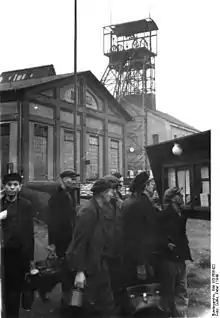
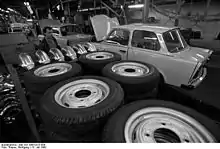
Coal mining
Coal mining is mentioned as early as 1348.[8] However, mining on an industrial scale first started in the early 19th century. The coal mines of Zwickau and the neighbouring Oelsnitz-Lugau coalfield contributed significantly to the industrialisation of the region and the town.
In 1885 Carl Wolf invented an improved gas-detecting safety mining-lamp. He held the first world patent for it. Together with his business partner Friemann he founded the "Friemann & Wolf" factory. Coal mining ceased in 1978. About 230 million tonnes had been mined to a depth of over 1,000 metres. In 1992 Zwickau's last coke oven plant was closed.
Many industrial branches developed in the town in the wake of the coal mining industry: mining equipment, iron and steel works, textile, machinery in addition to chemical, porcelain, paper, glass, dyestuffs, wire goods, tinware, stockings, and curtains. There were also steam saw-mills, diamond and glass polishing works, iron-foundries, and breweries.
Automotive industry
In 1904 the Horch automobile plant was founded, followed by the Audi factory in 1909. In 1932 both brands were incorporated into Auto Union but retained their independent trademarks. The Auto Union racing cars, developed by Ferdinand Porsche and Robert Eberan von Eberhorst, driven by Bernd Rosemeyer, Hans Stuck, Tazio Nuvolari, Ernst von Delius, became well known all over the world. During World War II, the Nazi government operated a satellite camp of the Flossenbürg concentration camp in Zwickau which was sited near the Horch Auto Union plant. The Nazi administration built a hard labour prison camp at Osterstein Castle. Both camps were liberated by the US Army in 1945. On 1 August 1945 military administration was handed over to the Soviet Army. The Auto Union factories of Horch and Audi were dismantled by the Soviets; Auto Union relocated to Ingolstadt, Bavaria, evolving into the present day Audi company. In 1948 all large companies were seized by the East German government.
With the founding of the German Democratic Republic in 1949 in East Germany, post-war reconstruction began. In 1958 the Horch and Audi factories were merged into the Sachsenring plant. At the Sachsenring automotive plant the compact Trabant cars were manufactured. These small cars had a two-cylinder, two-stroke engine. The car was the first vehicle in the world to be industrially manufactured with a plastic car body. The former VEB Sachsenring manufacturing site was acquired by Volkswagen in 1990 and has since been redeveloped as an engine and transmission manufacturing facility.
Audi-AG together with the city of Zwickau operates the August Horch Museum in the former Audi works.
Uranium mining
Two major industrial facilities of the Soviet SDAG Wismut were situated in the city: the uranium mill in Zwickau-Crossen, producing uranium concentrate (known as "yellow cake") from ores mined in the Erzgebirge and Thuringia, and the machine building plant in Zwickau-Cainsdorf producing equipment for the uranium mines and mills of East Germany. Uranium milling ended in 1989, and after the unification the Wismut machine building plant was sold to a private investor.
Boundaries
Zwickau is bounded by Mülsen, Reinsdorf, Wilkau-Hasslau, Hirschfeld (Verwaltungsgemeinschaft Kirchberg), Lichtentanne, Werdau, Neukirchen, Crimmitschau, Dennheritz (Verwaltungsgemeinschaft Crimmitschau) and the city of Glauchau.
Incorporations
- 1895: Pölbitz
- 1902: Marienthal
- 1905: Eckersbach
- 1922: Weissenborn
- 1923: Schedewitz
- 1939: Brand and Bockwa
- 1944: Oberhohndorf and Planitz
- 1953: Auerbach, Pöhlau and Niederhohndorf
- 1993: Hartmannsdorf
- 1996: Rottmannsdorf
- 1996: Crossen (with 4 municipalities on January 1, 1994 Schneppendorf)
- 1999: Cainsdorf, Mosel, Oberrothenbach and Schlunzig along with Hüttelsgrün (Lichtentanne) and Freiheitssiedlung
Population
| Year | Population |
|---|---|
| 1462 | ca. 3,900 |
| 1530 | ca. 7,677 |
| 1640 | 2,693 |
| 1723 | 3,753 |
| 1800 | 4,189 |
| 1840 | 9,740 |
| 1861 | 20,492 |
| 1871 | 27,322 |
| December 1, 1875 ¹ | 31,491 |
| December 1, 1890 ¹ | 44,198 |
| December 1, 1900 ¹ | 55,825 |
| December 1, 1905 ¹ | 68,502 |
| December 1, 1910 ¹ | 73,542 |
| June 16, 1925 ¹ | 80,358 |
| June 16, 1933 ¹ | 84,701 |
| May 17, 1939 ¹ | 85,198 |
| October 29, 1946 | 122,862 |
| August 31, 1950 | 138,844 |
| December 1, 1960 | 129,138 |
| December 31, 1972 | 124,796 |
| June 30, 1981 | 121,800 |
| 1986 | 120,900 |
| June 30, 1997 | 102,100 |
| December 31, 2002 | 100,892 |
| December 31, 2012 | 95,089 |
¹ Census data
Economy
The production of the Trabant was discontinued after German reunification, but Volkswagen built a new factory, and Sachsenring is now a supplier for the automobile industry. Nowadays the headquarters of the Volkswagen-Saxony Ltd. (a VW subsidiary) is in the northern part of Zwickau.
Education
Zwickau is home to the University of Applied Sciences Zwickau with about 4700 students and two campuses within the boundaries of Zwickau.
Politics
Mayor and city council
The first freely elected mayor after German reunification was Rainer Eichhorn of the Christian Democratic Union (CDU), who served from 1990 to 2001. The mayor was originally chosen by the city council, but since 1994 has been directly elected. Dietmar Vettermann, also of the CDU, served from 2001 until 2008. He was succeeded by Pia Findeiß of the Social Democratic Party (SPD). The most recent mayoral election was held on 7 June 2015, with a runoff held on 28 June, and the results were as follows:
| Candidate | Party | First round | Second round | |||
|---|---|---|---|---|---|---|
| Votes | % | Votes | % | |||
| Pia Findeiß | Social Democratic Party | 14,480 | 49.9 | 13,640 | 62.1 | |
| Michael Luther | Christian Democratic Union | 8,022 | 27.6 | 6,815 | 31.0 | |
| Sven Itzek | Alternative for Germany | 3,871 | 13.3 | |||
| Thomas Gerisch | Free Voters | 1,522 | 5.2 | 1,495 | 6.8 | |
| Jörg Dieter Ungethüm | Free Democratic Party | 1,149 | 4.0 | |||
| Valid votes | 29,044 | 98.2 | 21,950 | 98.4 | ||
| Invalid votes | 524 | 1.8 | 362 | 1.6 | ||
| Total | 29,568 | 100.0 | 22,312 | 100.0 | ||
| Electorate/voter turnout | 76,929 | 38.4 | 76,832 | 29.0 | ||
| Source: Wahlen in Sachsen | ||||||
The most recent city council election was held on 26 May 2019, and the results were as follows:
| Party | Votes | % | +/- | Seats | +/- | |
|---|---|---|---|---|---|---|
| Christian Democratic Union (CDU) | 25,267 | 22.0 | 11 | |||
| Alternative for Germany (AfD) | 25,112 | 21.9 | 11 | |||
| The Left (Die Linke) | 16,853 | 14.7 | 8 | |||
| Citizens for Zwickau (BfZ) | 12,359 | 10.8 | 5 | |||
| Social Democratic Party (SPD) | 11,726 | 10.2 | 5 | |||
| Alliance 90/The Greens (Grüne) | 7,503 | 6.5 | 3 | |||
| Free Democratic Party (FDP) | 6,368 | 5.5 | 3 | |||
| Human Environment Animal Protection (Tier) | 4,181 | 3.6 | New | 1 | New | |
| Future Zwickau | 3,266 | 2.8 | New | 1 | New | |
| Free Voters (FW) | 1,397 | 1.2 | 0 | |||
| Blue #TeamPetry | 897 | 0.8 | New | 0 | New | |
| Valid votes | 39,514 | 97.8 | ||||
| Invalid votes | 876 | 2.2 | ||||
| Total | 40,390 | 100.0 | 48 | ±0 | ||
| Electorate/voter turnout | 73,497 | 55.0 | ||||
| Source: Wahlen in Sachsen | ||||||
Historical mayors
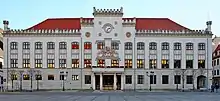
- 1501 – 1518: Erasmus Stella
- 1518 – 1530: Hermann Mühlpfort
- 1800, 1802, 1804, 1806, 1808, 1810, 1812, 1814: Carl Wilhelm Ferber
- 1801, 1803, 1805, 1807, 1809, 1811, 1813, 1815, 1817, 1819: Tobias Hempel
- 1816, 1818, 1820, 1822: Christian Gottlieb Haugk
- 1821, 1823, 1825, 1826: Carl Heinrich Rappius
- 1824 – Christian Heinrich Pinther
- 1827 – 1830: Christian Heinrich Mühlmann, Stadtvogt
- 1830 – 1832: Franz Adolf Marbach
- 1832 – 1860: Friedrich Wilhelm Meyer
- 1860 – 1898: Lothar Streit, from 1874 Lord Mayor
- 1898 – 1919: Karl Keil
- 1919 – 1934: Richard Holz
- 1934 – 1945: Ewald Dost
- 1945: Fritz Weber (acting Lord Mayor)
- 1945: Georg Ulrich Handke (1894-1962) (acting Lord Mayor)
- 1945 – 1949: Paul Müller
- 1949 – 1954: Otto Assmann (1901-1977)
- 1954 – 1958: Otto Schneider
- 1958 – 1969: Gustav Seifried
- 1969 – 1973: Liesbeth Windisch
- 1973 – 1977: Helmut Repmann
- 1977 – 1990: Heiner Fischer (1936-2016)
- 1990 – 2001: Rainer Eichhorn (born 1950)
- 2001 – 2008: Dietmar Vettermann (born 1957)
- 2008 – until now Pia Findeiss (born 1956)
Transport
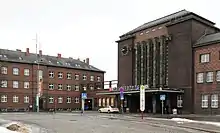
The city is close to the A4 (Dresden-Erfurt) and A72 (Hof-Chemnitz) Autobahns.
Zwickau Hauptbahnhof is on the Dresden–Werdau line, part of the Saxon-Franconian trunk line, connecting Nuremberg and Dresden. There are further railway connections to Leipzig as well as Karlovy Vary and Cheb in the Czech Republic. The core element of Zwickau's urban public transport system is the Zwickau tramway network; the system is also the prototype of the so-called Zwickau Model for such systems.
The closest airport is Leipzig-Altenburg, which has no scheduled commercial flights. The nearest major airports are Leipzig/Halle Airport and Dresden Airport, both of which offer a large number of national and international flights.
Museums
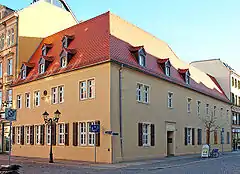
In the town centre there are three museums: an art museum from the 19th century and the houses of priests from 13th century, both located next to St. Mary's church. Just around the corner there is the Robert-Schumann museum. The museums offer different collections dedicated to the history of the town, as well as art and a mineralogical, palaeontological and geological collection with many specimens from the town and the nearby Erzgebirge mountains.
Zwickau is the birthplace of the composer Robert Schumann. The house where he was born in 1810 still stands in the marketplace. This is now called Robert Schumann House and is a museum dedicated to him.
The histories of the Audi and Horch automobile factories are presented at the August Horch Museum Zwickau. The museum is an Anchor Point of the European Route of Industrial Heritage (EIRH).
Notable people
Born before 1900
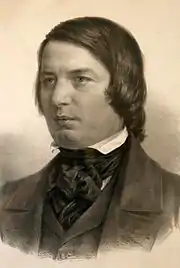
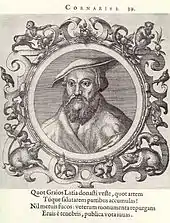
- Nicholas Storch, (before 1500–after 1536), weaver and lay preacher (Zwickau Prophets)
- Janus Cornarius, (c. 1500–1558), philologist and physicians
.JPG.webp)
- Gregor Haloander, (1501–1531), jurist
- David Köler, (1532–1565), musician, organist, choirmaster, composer
- Jacob Leupold, (1674–1727), German mechanic and instrument maker
- Robert Schumann, (1810–1856) composer of the romantic era
- Heinrich Schurtz, (1863–1903), German ethnologist and historian
- August Horch, (1868–1952), automotive engineer, honorary doctorate from the Technical University of Braunschweig
- Heinrich Waentig, (1870–1943), German economist and politician (SPD)
- Hans Dominik, (1872–1945), German writer, journalist and engineer
- Fritz Bleyl, (1880–1966) expressionist painter and architect
- Max Pechstein, (1881–1955) expressionist painter
- "Margaret Scott" (1888-1973) was a militant suffragette in London
- Paul Langheinrich, (1895-1979) German genealogist
Born after 1900
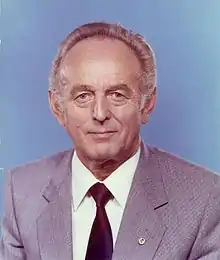
- Robert Eberan von Eberhorst, (1902–1982) Austrian automotive engineer
- Gershom Schocken (1912–1990), Israeli journalist and politician
- Gert Fröbe, (1913–1988), actor in numerous film and stage roles including Goldfinger (1964)
- Gerhard Schürer, (1921–2010), German politician (SED)
- Gerhard Sommer (born 1921), SS-Untersturmführer (Second Lieutenant) involved in the massacre of 560 civilians
- Rolf Hädrich, (1931–2000), German film director and screenwriter
- Dieter F. Uchtdorf, (born 1940), Second Counselor in The Church of Jesus Christ of Latter-day Saints, lived here following World War II
- Harald Fritzsch, (born 1943), German theoretical physicist (quantum theory)
- Volkmar Weiss, (born 1944), German geneticists, social historian and genealogist
- Jürgen Croy, (born 1946), Goalkeeper (football) at former BSG Sachsenring Zwickau
- Christoph Bergner, (born 1948), German politician (CDU), 1993-1994 Prime Minister of Saxony-Anhalt
- Eckart Viehweg, (1948–2010), German mathematician
- Hagen von Ortloff, (born 1949), German TV-journalist (Eisenbahn-Romantik)
- Werner Schulz, (born 1950), German politician (Alliance '90 / The Greens)
- Christoph Daum, (born 1953), football player and coach
- Lutz Dombrowski, (born 1959), German athlete and Olympic champion
- Lars Riedel, (born 1967), German discus thrower
- Sven Günther, (born 1974), German footballer
- Cathleen Martini, (born 1982), world champion in bobsleigh in 2011
- Marie-Elisabeth Hecker (born 1987), classical cellist
- Kristin Gierisch, (born 1990), European Indoor triple jump champion in 2017
Twin towns — sister cities
 Jablonec nad Nisou, Czech Republic, since 1971
Jablonec nad Nisou, Czech Republic, since 1971 Zaanstad, Netherlands, since 1987
Zaanstad, Netherlands, since 1987 Dortmund, North Rhine-Westphalia, Germany, since 1988
Dortmund, North Rhine-Westphalia, Germany, since 1988 Volodymyr-Volynskyi, Ukraine, since 2014
Volodymyr-Volynskyi, Ukraine, since 2014
References
- "Bevölkerung des Freistaates Sachsen nach Gemeinden am 31. Dezember 2019". Statistisches Landesamt des Freistaates Sachsen (in German). July 2020.
- "Zwickau in Zahlen" [Zwickau in numbers]. zwickau.de (in German). Archived from the original on July 17, 2016. Retrieved September 20, 2019.
- "Wirtschaft & Standort" [Industry & Location]. zwickau.de (in German). Retrieved September 20, 2019.
- "How to find us". horch-museum.de. Retrieved September 20, 2019.
- ADAC Travel Guide, Towns and Cities from A to Z – City Guide Germany Travel Information, first edition June 2005, 368 pages, ISBN 3-89905-233-1
- "Mulderadweg" [Mulde bike lane] (in German). Retrieved February 1, 2019.
- Zwickau by Stadtbaurat Ebersbach in: Deutschlands Städtebau (Germany's Urban Development), Deutscher Architektur und Industrieverlag Berlin 1921
-
 One or more of the preceding sentences incorporates text from a publication now in the public domain: Chisholm, Hugh, ed. (1911). "Zwickau". Encyclopædia Britannica. 28 (11th ed.). Cambridge University Press. p. 1061.
One or more of the preceding sentences incorporates text from a publication now in the public domain: Chisholm, Hugh, ed. (1911). "Zwickau". Encyclopædia Britannica. 28 (11th ed.). Cambridge University Press. p. 1061. - Wojciech Königsberg. "Czarny Legion - polska organizacja podziemna rozbita przez Niemców". WP Opinie (in Polish). Retrieved March 8, 2020.
- "Poznańska piątka". Gosc.pl (in Polish). Retrieved March 8, 2020.
- "Zwickau Subcamp". KZ-Gedenkstätte Flossenbürg. Retrieved March 8, 2020.
External links
| Wikivoyage has a travel guide for Zwickau. |
- Zwickau Official website (in German)
- August-Horch Museum at Audi Works (in German)